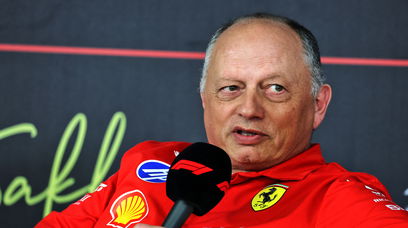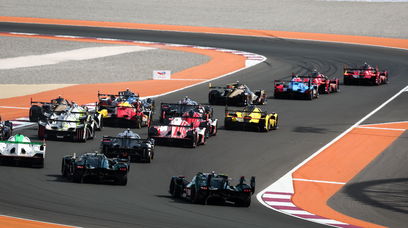What is it about Formula 1’s current obsession with OEMs? Before we cut to the chase, let us examine the etymology of ‘OEM’, an abbreviation for Original Equipment Manufacturers and originally applied to differentiate between genuine and aftermarket (identical to the original, but different branding) or even counterfeit parts. Later the term was adopted by the wider industry to denote car companies. When ‘OEM’ is bandied about in F1 it refers to such teams as Ferrari and Alpine, but not to Haas and Williams, whose parent companies have no links to OEMs save as powertrain customers of Ferrari and Mercedes respectively. Similarly, Red Bull Racing and sister AlphaTauri (now) are owned by an energy drink company and have no OEM links. In fact, they now pay Honda for power unit supplies. Much is made of Sauber’s deal with Alfa Romeo and Aston Martin’s with the eponymous road car brand, but these are marketing exercises. Indeed, AMF1 are privately owned, and Aston Martin Lagonda (road cars) are a listed entity: the only links are at the very top, where Yew Tree, an investment vehicle controlled by Lawrence Stroll, has stakes in both. Indeed, a branding deal (to 2030) is outlined in AML financial reports. As for Sauber: the team are currently owned by a Swedish investment consortium, with Audi taking a 25% interest in October, which will be ramped up before the Four Rings officially enters as team for 2026-onwards. Once Audi acquires majority control of Sauber – the word is the Swedes will retain a share – the team’s status changes from independent to ‘works team’, as OEMs like to dub their racing interests. McLaren falls between these extremes: They purchase customer PUs and have an automotive sister which outsources its PUs and hardware. That leaves Mercedes, which, crucially, is NOT a works or OEM-owned team if above definitions are strictly applied: The Three-Pointed Star has but a one-third share in the team that bears its name. The other two-thirds are split equally between team boss Toto Wolff and chemical conglomerate INEOS, and, in fact, the team acquires power units from Mercedes High Performance Powertrains Ltd - a separate entity of which Wolff, saliently, is not a director nor shareholder - on a commercial customer basis, just as do McLaren, Aston Martin and Williams. Still, Wolff previously stated , “Everybody now in F1, including Sauber has an OEM as a partner; the only ones who do not are Williams and Haas. But, without doubt, I believe in those structures that have been here for a long time, especially Williams.” His comments are, on the face of it, true, save that the word “partnership” is clearly applied elastically, ranging from zero percent team ownership (Aston Martin) through 33,3% (Mercedes) to Alpine and Ferrari’s 100%. Clearly, then Andretti-Cadillac partnership fits into that constellation, even if the latter’s future direct interest is zero – no different to Aston Martin F1 Team’s time-bound lease of name and colour from AML.
Few successes for OEMs in F1
Which begs the question: Why does Wolff not criticise Aston Martin? Because he owns shares in AML? Because they are fellow Mercedes PU customers and rent the Mercedes wind tunnel, because Mercedes (main company) is a shareholder in AML? Because Aston Martin has deals to purchase parts as permitted by the regulations from Mercedes F1? Equally, why cover up for Williams, thereby hanging Haas - which shaded the British team 4:3 in the seven years since the US outfit entered F1 in 2016 - out to dry, if only by implication? Because Wolff was once a shareholder in the team for which his wife Susie was a test driver? Because Williams are a Mercedes engine customer? Overlooked in these OEM arguments is that without Haas F1 would now be down to nine teams… Talking of which, OEMs have a terrible record in F1, entering and exiting on a whim: Whether Alfa Romeo, Aston Martin, BMW, Ford (Jaguar), Honda, Mercedes, Renault (Alpine) or Toyota, all have come and gone at some stage - whether as teams and/or engine suppliers - selfishly inevitably leaving massive voids. The only constant are Ferrari, and even the Scuderia regularly suggest they may walk. Then, Ferrari are a special case. Think back to 2004 when no fewer than seven OEMs graced F1 grids to varying degrees of success, then fast forward six years when the tally was down to three. Yes, Mercedes came in then as team owner, but only after acquiring independent outfit Brawn GP for a song and eyeing up the (very) weak opposition. Still, hard results took five years to eventuate. A glance through UK Company House records shows the Mercedes registration number to have been that of Tyrrell - a privateer team run from a timber yard - which begat BAR who mutated into Honda before being sold to Brawn for a token dollar after serial failures. Here’s betting Andretti have better facilities than that… Equally, Alpine started out as the privateer Toleman saloon car/Formula Ford team before working their way up to F1. Clothing brand Benetton acquired the team - winning back-to-back titles via Michael Schumacher - before being sold to Renault, who moved it on to Genii Capital, who sold it back to Renault who renamed it Alpine. Any wonder the team are colloquially known as Team Enstone? Red Bull Racing had been Jaguar which had been Stewart. In fact, the only OEM to enter F1 with a turn-key operation was Toyota, which blew billions before exiting after nine years without a single win to its name. Possibly Wolff and Co prefer to face such weak opposition?
OEMs do not own F1
Criticism is levelled at Cadillac for plans to rebadge customer power units while building up F1 experience. So what - Porsche planned to rebadge Red Bull power units to enter F1, yet this project drew praise from the likes of Wolff. He may also like to consider that Mercedes did exactly that with Ilmor during their early years, as did Ford with Cosworth! Talking of which, OEMs arrogantly imply they alone are ‘additive’ - F1-speak for value-added activities - yet in their navel gazing they overlook that the most ‘additive’ current brand is not Mercedes or Alpine or Aston Martin, but Red Bull. Indeed, for many years it was tobacco companies who added the most commercial value to the sport through relentless marketing campaigns. Thus, it seems the real reason for antipathy towards Andretti (and Cadillac) is financial - and not some ‘additive’ bovine manure: OEMs fear a 10% dilution of the prize pot (and more if Andretti beats some of their number), but so what? OEMs do not own F1 - the FIA does - and the budget cap saved teams more than Andretti could deprive them of, while an 11th (and potentially 12th) team(s) will add substantially to F1’s overall spectacle. Indeed, the last series owned by OEMs was DTM and the last time I looked it was bankrupt…
Most read






